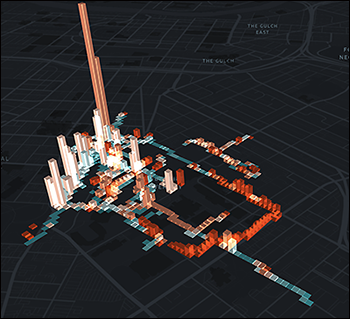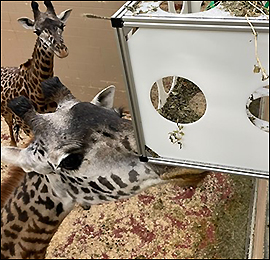Two-day event in Featheringill Hall to showcase 77 engineering design projects
Design Days 2022 in the Vanderbilt School of Engineering will highlight 77 problem-solving projects developed by teams of students during the 2021-2022 academic year. The annual celebration returns to an in-person jam-packed event in Featheringill Hall following two years of virtual showcases. A Design Days catalog features interactive links to projects’ descriptions.
On Thursday, April 28, students in the Department of Computer Science will demonstrate 30 of more than 50 student projects in the department’s spring Immersion Projects Showcase. Trilliant Health Senior Vice President Krzysztof Zienkiewicz, BS’14, MS’16, is a guest speaker at 4 p.m. in Jacobs Believed In Me Auditorium, Featheringill Hall Room 134. The student showcase opens at 5 p.m. in Featheringill Hall.
Several design prizes are awarded at the end of the spring semester. This year, a new award for computer science teams has been created. A Computer Science Design Prize from FortyAU, a Nashville-based software development company specializing in customized solutions for a wide variety of industries including fintech, health care, and nonprofit, will be awarded.

On Friday, April 29, 47 engineering design projects from the school’s other six departments will be on display and students will deliver presentations from 5-7 p.m. in Featheringill Hall.
These projects were completed in partnership with a multitude of sponsors including Nissan North America, NASA Marshall Space Flight Center, Vanderbilt University Medical Center, Permobil, Mars Petcare, Sterling Ranch Development Company, Booz Allen Hamilton, Gresham Smith, Tennessee Department of Environment and Conservation, NeXTMed, and many more. Multiple Vanderbilt and Vanderbilt University Medical Center departments sponsored projects and provided advisers as well.
Also on April 29 from 3-4 p.m., the Department of Biomedical Engineering will dedicate its senior design loft in memory of the late Professor Matthew Walker III, who developed and taught the innovative biomedical engineering design curriculum. In 2021, the School of Engineering and the biomedical engineering department launched a campaign to rename a design lab in Walker’s honor. The Walker design loft fund was featured today in Vanderbilt’s Giving Day event.
“Design courses provide students with experience working on real-world projects that involve design constraints, budgets, reviews and deadlines. Students learned about professionalism, teamwork, entrepreneurship, and resilience,” said Thomas Withrow, assistant dean for design
and associate professor of the practice of mechanical engineering. “Our design events have always been a celebration of all the lessons learned during their engineering educations.”
One biomedical engineering team has developed a removable and supportive backing for a biodegradable dermal patch. The elastic material can be pressed into a thin film while still retaining necessary mechanical properties that help maintain the shape of the wound bed.

A chemical engineering team designed an articulating prosthetic finger for an amputee’s dominant hand using fused filament fabrication technology. A civil engineering team partnered with the Vanderbilt University Medical Center and Gresham Smith, a Nashville-based architecture, engineering and design practice, to pilot a new method—empathic data collection—of informing roadway redesign. Heart rate and campus location data from smart watches was collect into an aggregated, anonymized data set to determine pedestrian stress levels.
Teams designed a hoofstock animal enrichment feeder for the Nashville Zoo, autonomous features for power wheelchairs, a streamlined and optimized supply chain process for Mars Petcare, and a litter collection device for the Cumberland River Compact.
Other projects include:
- An unmanned, underwater vehicles docking and communications buoy,
- An ultrasound-compatible helmet system for brain imaging,
- Design and optimization of a water treatment network for Sterling Ranch in Colorado,
- A smart pill bottle for tracking patient adherence, and
- An autonomous interior painting robot.
Contact Brenda Ellis, 615 343-6314
brenda.ellis@vanderbilt.edu